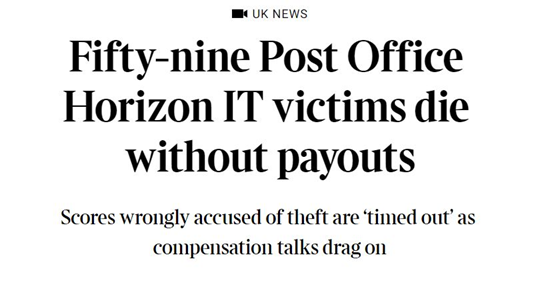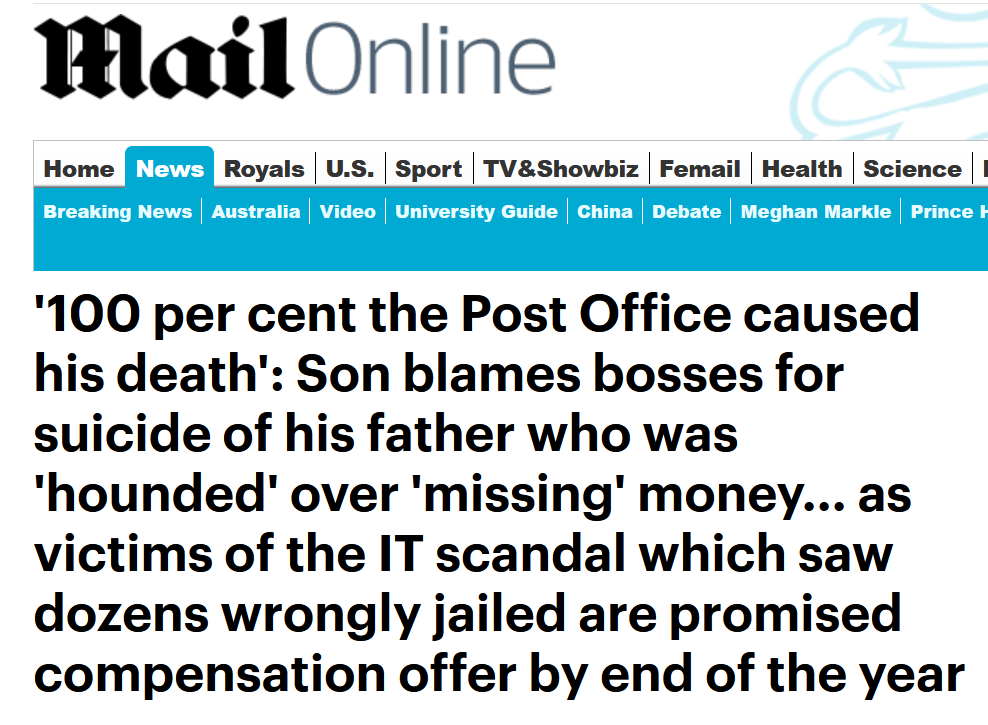
Sir Humphrey, permanent secretary at the fictional Department for Administrative Affairs, and his minister Jim Hacker, discuss (below) the Post Office IT scandal.
By Tony Collins
Hacker: Ah Humphrey. Please pull up a chair.
Humphrey: (stands at Hacker’s desk) Thank you minister.
Hacker: I want to ask you about this Post Office IT scandal. I’ve heard –
Humphrey: Not our department minister.
Hacker: I know but it affects all of us. The Post Office is 100% owned by government and government has behaved abominably. I’ve heard a great deal about it from constituents and their experts. Are there any similarities with the latest Covid scandal?
Humphrey: What Covid scandal?
Hacker: Don’t you read the newspapers? We did our best to stop Downing Street’s Google apps and Whatsapp messages reaching the Covid inquiry.
Humphrey: No similarities minister. The Post Office erroneously prosecuted about 700 postmasters or their staff on the basis of information from a faulty computer system. That has nothing to do with the Covid-19 pandemic inquiry.
Hacker: Cover-ups Humphrey. They are both about cover-ups. The Post Office IT scandal is about a cover-up of faults with the so-called Horizon system supplied by a Japanese company called Fujitsu. In the Covid inquiry we’ve paid vast sums to lawyers to decide what information is relevant to release and what not to release. That’s another cover-up. Does the state have a problem with truth Humphrey?
Humphrey: No problem with truth as long as it doesn’t get into the public domain.
Hacker: I’m in no mood Humphrey. I was being serious.
Humphrey: (gravely) I was entirely serious minister. Truth in democratic institutions is a difficult concept. We’ve been through this before. Governments would last a very short time if truth were allowed freely into the public domain. You don’t want opposition MPs to seize on carelessly-released facts to dance over your metaphorical grave. It’s my responsibility and that of my colleagues to protect you and other ministers from damaging criticism or embarrassment.
Hacker: That’s ridiculous Humphrey. The papers are full of criticism every day. I am being criticised or embarrassed practically all the time.
Humphrey: Nobody minds criticism. As long as it’s not informed by the actual truth.
Hacker: Thank goodness then for Parliamentary debates, Parliamentary questions, select committee reports, the National Audit Office and public inquiries. You and your colleagues don’t monopolise truth as much as you would like.
Humphrey: Actually we control the truth in all those cases. We release as much of it as we consider it is in the public interest to disclose.
Hacker: Thank goodness for leaks then.
Humphrey: We control those as well.
Hacker: (pensive) Of course. Downing Street leaks like a sieve. It’s the one ship that leaks from the top.
Humphrey: Quite. And how many ministerial lunches have you had this month with newspaper editors?
Hacker: You are horribly right Humphrey. I am beginning to understand the Post Office IT scandal… the truth about the Horizon computer system was missing because nobody wanted to find it.
Humphrey: To an extent yes. But the Post Office went over the top.
Hacker: Go on.
Humphrey: Well innocent people are not normally imprisoned when something goes wrong with a government computer system.
Hacker: Why with the Post Office then?
Humphrey: As I say, it is perfectly normal for government institutions to protect information about faults in their computer systems. It would not have been in the public interest for Mr and Mrs Jones to go into their local post office for foreign currency or everyday banking and see headlines about the Post Office’s computer systems being infested with bugs. If people stopped going to the post office, swathes of branches would close.
Hacker: And bonuses for directors would have been affected?
Humphrey: I am sure that is not the reason for protecting information about Horizon.
Hacker: (Angry) What was the reason then? To shore up the Post Office’s commercial position by confiscating homes, businesses and sometimes even wedding rings of entirely innocent people who happened to be using this Horizon system when it kept running up phantom debts? Some of these poor people are my constituents. Humphrey, why were your colleagues standing by … with condescending insouciance … while dozens of innocent postmasters went to prison and Post Office executives collected bonuses on the back of the Post Office’s financial performance?
Humphrey: I understand that various compensation schemes are meeting requirements.
Hacker: Meeting requirements! Humphrey, we are waiting for people to die before we pay compensation.
Humphrey: It’s my understanding that fair amounts of compensation are being paid.
Hacker: When claimants are dead. Humphrey, I must demand your colleagues pay proper compensation while claimants are still alive.
Humphrey: If that’s true it’s most regrettable. I’d understood my colleagues are doing their best to ensure payments are on time and that the correct amounts are paid out of the public purse.
Hacker: Yes most regrettable Humphrey. [Picks up Sidmouth Herald) I see we’ve done the right thing by postmaster Russell Ward-Best from the beautiful Devon town of Ottery St Mary.
Humphrey: On the River Otter. I know it well.
Hacker: He was blamed for £17,000 shown as missing on Horizon and lost his job. He went bankrupt. [Reads from the Sidmouth Herald] …
Humphrey: “Now the Post Office has formally recognised he did nothing wrong. Its Historical Shortfall compensation scheme has paid off all his bankruptcy debts along with the interest accrued over more than 20 years, and the bankruptcy will be removed from his records. His name has been cleared.” That is a recent article Humphrey.
Humphrey: [Smugly] Yes, as I said, the system of restitution is working. Everything is being put right.
Hacker: Russell Ward-Best is dead. He died in 2016. His marriage broke up and he descended into debt and depression. He protested his innocence right up to his death. He went to the grave without a penny in compensation. He is one of dozens who’ve died in similar horrific circumstances. Now do you say the system is working?
Humphrey: (head bowed, says nothing)
Hacker: These postmasters were trying to give to their communities. They wanted to serve. They hardly made a living in many cases. The Post Office mendaciously took their homes and businesses. Its abominable prosecutions saw many of them lose their liberty. Some despairing and destitute postmasters even committed suicide. And all your former colleagues did was stand on the sidelines yawning with boredom at what was happening. Your current colleagues are hardly any better: they’re obsessed with making sure we don’t overpay compensation.
Humphrey: [head still bowed] We must represent the taxpayer as well as the victims.
Hacker: “We need to start being counter-intuitive with compensation Humphrey: keep it simple. Stop all these different compensation schemes with their own complicated rules. We need to stop swamping each case in a mass of bureaucracy to put people off claiming. A tiny number of victims have come forward for compensation. That’s hardly surprising.
Humphrey: I must emphasise that it’s not our department. It’s my understanding that my colleagues are trying to keep the rules for compensation payments as fair, consistent and simple as possible.
Hacker: I don’t mean a Whitehall simplification process that ends up paying lawyers far more than the victims. I mean a genuine simplification. Let’s put claims into bands like the Council Tax bands – A to F. We do a short assessment with each claimant – lasting an hour or two at the most – not months or years as at present – and counter-intuitively we assume claimants are telling the truth. We stop assuming they’re lying. And we stop paying our lawyers vast sums to find out if claimants are lying.
Humphrey: The Treasury has to approve payments I’m afraid. They won’t mind underpayments but they will not allow deliberate overpayments that have not been properly assessed.
Hacker: We overpaid tens of billions for PPE and Track and Trace. The Treasury turned a blind eye to those overpayments. Why is it now obsessed with not making overpayments to postmasters? It is simply not possible to overpay these people. A government institution has ruined their lives. No amount of money will make up for it. If we continue to obsess about overpayments, we’ll let more people die without anything at all. Do we secretly hold a grudge against these postmasters for exposing a government machine that’s largely dysfunctional? Can I tell my constituents that we’re at last starting – genuinely and immediately – to address the injustices of it all?
Humphrey: I would be surprised if my colleagues were not already being generous at times in the amounts they paid. And we’ve recently made sure tax doesn’t swallow up much of the compensation.
Hacker: Humphrey, watching these compensation schemes is like watching a sports team with a mass of breathing equipment trying to run the 100 metres underwater. Just put claimants in an A to F band and pay them now. Otherwise Whitehall’s critics will be right to call you and your colleagues totally heartless. The BBC says the Post Office IT scandal is far from over. It is absolutely correct.
Humphrey: I agree that we need to do more to resolve matters.
Hacker: Humphrey, officials have been saying that for years. You’d soon pull your finger out if it was your mother, father, sister or brother in the grave. We’re all tainted by this scandal.
Humphrey: (Recovering) I am not sure where you are going with this minister. The Post Office IT scandal is an unfortunate affair. I feel enormous sympathy for the victims but, as far as I and my colleagues are concerned, it is a one-off matter. We are not all tainted.
Hacker: We are all tainted Humphrey. Please don’t ooze complacency when cover-ups are the norm. Look at all the families that lost a loved one to Covid. We repay them with an inquiry where we try and cover up in the so-called public interest, in good faith? Where is your sense of sense of right and wrong in all this Humphrey?
Humphrey: We could launch a search.
Hacker: You are making light of it. This couldn’t be more serious.
Humphrey: I am not making light of it minister. I suggested we launch a search because I don’t think the answer would be easy to find. My colleagues and I don’t do right and wrong. Subjective values cannot determine Civil Service protocols, conventions and codes. One person’s right is another’s wrong – and we are most definitely neutral. We could not hope to come up with answers to questions of right and wrong when thousands of years of philosophy have not produced a clear consensus. We do our work, therefore, without the slightest notion of any difference between right and wrong.
Hacker: Now I’m beginning to understand the Post Office IT scandal and how your colleagues were content to let it happen. We’ll resume this another time. You are free to leave.
Humphrey: Yes minister


BBC News – 1 December 2022








Excellent take via this creative Yes Minister script. Well done.
LikeLike
Thank you. Trouble is, the subject matter is beyond parody.
LikeLike
Thank you Zara. It good to hear from you too. Tony.
LikeLiked by 1 person
Wonderful to hear from you, Tony, but so sad that we are still dealing with the Post Office scandal, which should have been addressed and completed satisfactorily years ago.
I appreciate your intelligent reference to Yes, Minister – I’m sure it will resonate with many, even if you and the TV programme are far more civilized than our present shower of venal third raters.
IMO, because we are an indebted nation, I can’t see matters improving. Those in power seem to have a mandate to prioritize their own interests whilst running the country down (along with all the five eyes nations) as high finance moves from West to East, leaving citizens too impotent to resist.
I hope I am wrong and our third raters suddenly develop a human conscience and do the right thing for the PO victims.
Thank you for keeping the faith.
LikeLike